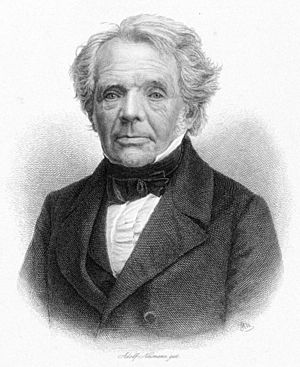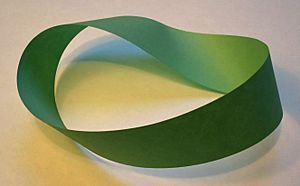August Ferdinand Möbius facts for kids
Quick facts for kids
August Möbius
|
|
|---|---|

August Ferdinand Möbius (1790–1868)
|
|
| Born |
August Ferdinand Möbius
17 November 1790 Schulpforta, Electorate of Saxony
|
| Died | 26 September 1868 (aged 77) |
| Nationality | Saxon |
| Alma mater | University of Leipzig University of Göttingen University of Halle |
| Known for | Möbius strip Möbius transformations Möbius transform Möbius function Möbius inversion formula Möbius–Kantor configuration Möbius–Kantor graph |
| Scientific career | |
| Fields | Mathematician |
| Institutions | University of Leipzig |
| Doctoral advisor | Johann Pfaff |
| Other academic advisors | Carl Friedrich Gauss Karl Mollweide |
| Doctoral students | Otto Wilhelm Fiedler |
| Other notable students | Hermann Hankel |
August Ferdinand Möbius (born November 17, 1790 – died September 26, 1868) was a German astronomer and mathematician. He taught at the University of Leipzig. Möbius wrote many papers about geometry and space, and also about stars and planets (astronomy). He came up with new ideas like homogeneous coordinates and the concept of Duality in Projective Geometry. He is also known as one of the first people to study topology, which is a branch of mathematics. His most famous discovery in topology is the amazing Möbius strip.
Early Life and Learning
Möbius was born in Schulpforta, a town in Saxony-Anhalt, Germany. An interesting fact is that his mother's family was related to the famous religious leader Martin Luther.
He learned at home until he was 13 years old. In 1803, he started attending a college in Schulpforta. He studied there and finished his studies in 1809.
After college, he went to the University of Leipzig. There, he studied astronomy with a mathematician and astronomer named Karl Mollweide. In 1813, he moved to the University of Göttingen. He continued to study astronomy with the brilliant professor Carl Friedrich Gauss. Gauss was also in charge of the Göttingen Observatory at that time.
Later, Möbius studied with Johann Pfaff at the University of Halle. In 1815, he finished his important doctoral paper called The occultation of fixed stars. This paper was about how stars can be hidden by other celestial bodies.
In 1816, Möbius became a special professor at the University of Leipzig. He taught about astronomy and advanced mechanics. He passed away in Leipzig in 1868 when he was 77 years old. His son, Theodor Möbius, became a well-known expert in languages.
His Discoveries and Ideas

Möbius is most famous for discovering the Möbius strip. This is a unique two-dimensional surface that has only one side! Another scientist, Johann Benedict Listing, also found it around the same time.
He also had other important ideas in mathematics:
- The Möbius configuration is a special shape made from two connected tetrahedra (pyramid-like shapes).
- He was the first to use homogeneous coordinates in projective geometry. This is a way to describe points in space using numbers.
- He also introduced the Barycentric coordinate system. This system helps locate points inside a shape by using the weights of its corners.
Many math ideas are named after him, like the Möbius plane and Möbius transformations. These are important in projective geometry. He also worked on number theory, which led to the Möbius function and the Möbius inversion formula. These are tools used to solve problems with numbers.
In Euclidean geometry, he made it simpler to work with angles and lines by using "signed" values. This helped to combine different math results.
See also
 In Spanish: August Möbius para niños
In Spanish: August Möbius para niños

